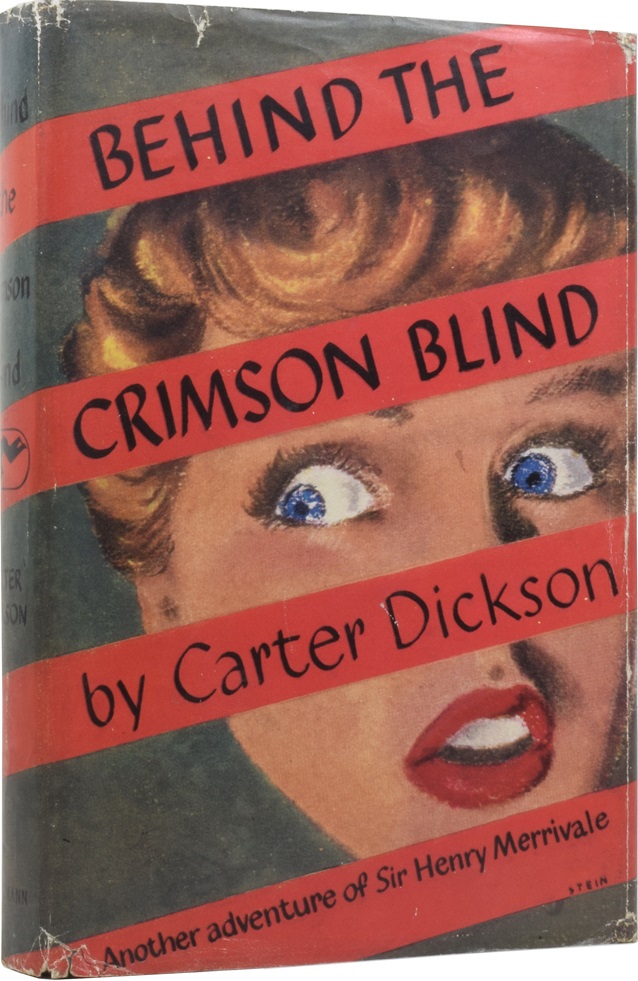Book Review: Behind the Crimson Blind by Carter Dickson
Sir Henry Merrivale, brilliant amateur detective, barrister, baronet and holder of a medical degree, has had many exciting adventures in Britain, Europe and America. He feels that he’s earned a bit of a holiday, so he’s incognito on a flight to Tangier. Except that the very distinctive lord is easily spotted by American secretary Maureen Holmes, who is on her own vacation. And alighting from the plane, H.M. is greeted by a brass band and red carpet treatment!

Also present in the welcoming party are Commandant Alvarez (Anglo-Spanish) of the local police, and pretty English blonde Paula Bentley, whose husband Bill works for the British embassy. Sir Henry passes Maureen off as his own secretary, and they all go to the house of Colonel Duroc, a Belgian who is head of the Tangier police. It seems the police need his help. The Maestro initially refuses, but the word “impossible” comes up and he can’t resist.
It seems that while Sir Henry has been away in America, Europe has been taken by storm by the jewel thief Iron Chest. Though no one can remember his face, they all know him by the large iron chest carved with laughing monkeys that he carries about for unknown reasons. He’s pulled off a number of daring burglaries, and has a habit of vanishing, chest and all, whenever people think they’ve cornered him. It’s known that Iron Chest will be striking in Tangier, but not who he is (or even if it’s a “he”) or how his tricks are done.
So it’s up to Sir Henry Merrivale to navigate the foreign city with its colorful cast, even penetrating into the very Casbah to learn the truth behind the wicked Iron Chest!
This was the 21st of 22 Henry Merrivale novels by Carter Dickson (aka John Dickson Carr). The first, The Plague Court Murders, was published in 1934 and this one in 1952, according to the internal chronology, Sir Henry is an octogenarian, though a spry one who easily disposes of a mugger. Most of them involve a locked room murder or other “impossible” crime.
Good: There’s a lot of landscape and social detail, based on the author’s own visit to Tangier. There is very much a feel of this exotic city from a foreigner’s point of view. There are some exciting action scenes, and Iron Chest’s central gimmick makes a certain amount of sense.
Less good: Local color notwithstanding, all the important characters are European or American, with the Moroccans as backdrops; only two servants really even get dialogue. Maureen and Paula are there to admire their relatively young men, moving the plot along by coincidence (they find the crimson blind of the title), and Maureen being sidelined for most of the climax due to emotional distress.
Sir Henry’s “comical” antics, including a turn in brownface, are frequently a bit too thick to be enjoyed.
At the risk of spoilers, the different treatment of the two main criminals is noteworthy. One of them is depicted as scum. His unpleasant character traits are added to a sordid past, and to sugar the pudding, he’s a Communist (with heavy-handed symbolism.) He’s forced to participate in a “righteous” beatdown of himself before being subjected to an entirely lopsided finale. The other criminal is depicted as a jolly good fellow, his crimes excused by Sir Henry, and is let go in the end with a reference to Robin Hood, even though he by no means gives to the poor or battles unjust authority.
Cringy: outdated slang terms for women that are supposed to come off as affectionate, but don’t.
Content note: period colonialist attitudes towards the locals, the “bad” criminal uses racist slurs.
Overall: Not one of the better Merrivale books. You might want to consult a list for other choices if you aren’t familiar with the character.

